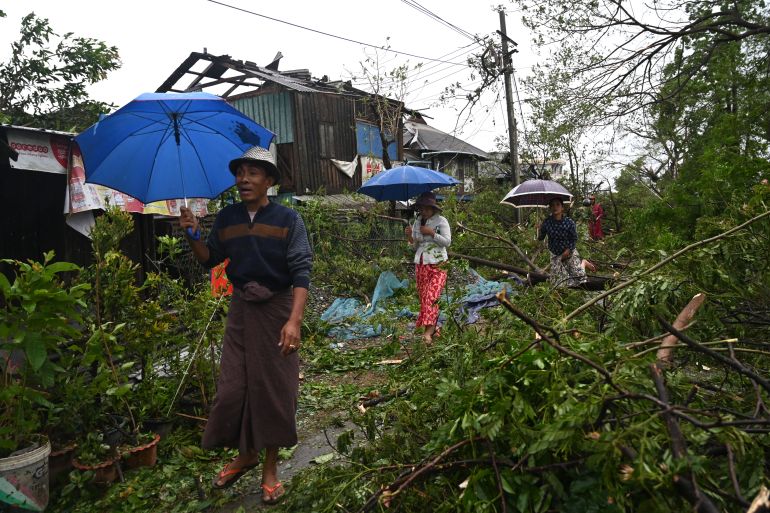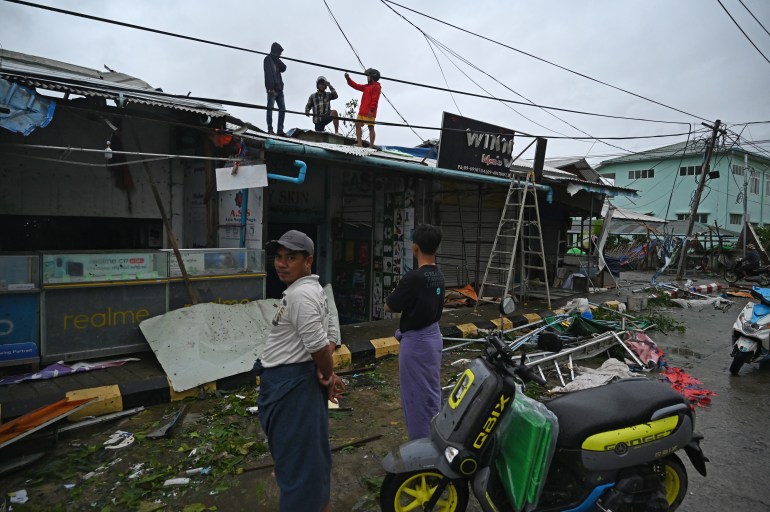Flooding, communications blackout as Cyclone Mocha hits Myanmar
The storm is one of the most powerful to ever hit the region with winds as strong as 250km/h (155 mph).

Cyclone Mocha has crashed ashore in Myanmar leaving relief workers struggling to assess the extent of the damage because the storm caused major disruption to communications.
One of the most powerful storms to ever hit the region crossed the coast of northwestern Rakhine State, south of the Bangladesh border on Sunday at about 1:30pm (07:00 GMT), uprooting trees, bringing down pylons and cables, and creating a tidal surge that inundated streets in the low-lying region.
Keep reading
list of 3 itemsWhat’s the difference between hurricanes, cyclones and typhoons?
Are storms getting more powerful and dangerous?
With winds of up to 250 kilometres per hour (155 miles per hour), Mocha struck between Myanmar’s Sittwe and Cox’s Bazar in Bangladesh, the home to nearly one million mostly Muslim Rohingya refugees who were forced out of Myanmar in a 2017 military crackdown that is now the subject of a genocide investigation at the International Court of Justice.
The main Rohingya refugee camp in Cox’s Bazar appeared to have been spared the worst of the cyclone, but it is likely to take some time for a clearer picture to emerge.
“It will take days and weeks to confirm the real damage [from the cyclone] as there are several small scattered coastal islands where fishermen don’t have means to communicate and don’t pay heed to warnings,” Al Jazeera’s Tanvir Chowdhury said from Cox’s Bazar.
In Myanmar, early reports suggested Sittwe, the capital of Rakhine state, had been badly damaged.
Local media showed hoardings buckled and thrown onto the road, and fallen trees and pylons blocking the streets. A storm surge of as much as 3.5 metres also caused extensive flooding in the low-lying area, according to a flash update on Sunday from the UN Office for the Coordination of Humanitarian Affairs (UNOCHA).
Myanmar’s military information office said the cyclone had caused damage in Sittwe, Kyaukpyu and Gwa townships. It also tore roofs off sports buildings on the Coco Islands, about 425km (264 miles) southwest of the country’s largest city, Yangon, it added.
The collapse of a communication tower also cut out internet and phone services, complicating damage assessment efforts.
“It is a rather grim morning for us,” Ramanathan Balakrishnan, the UN Resident Coordinator in Myanmar told Al Jazeera from Yangon. “The Myanmar coast and Rakhine in particular have borne the brunt of the impact of this extremely severe storm.”
The UN was deploying emergency teams, he said, adding that because many people had been displaced from their homes they were living in shelters that were not sturdy.
“We expect damage to be heavy.”
‘People are in trouble’
Myanmar was plunged into crisis when the military seized power in a coup in February 2021, sparking mass protests that evolved into an armed rebellion when the army responded with force.
People in Rakhine have suffered years of conflict and displacement, with hundreds of thousands of Rohingya confined to temporary camps where their movements are restricted.
The military and the United League of Arakan (ULA), the political wing of the ethnic Arakan Army, each claim administrative control in Rakhine state, which could further hamper relief efforts.
A large number of structures in Sittwe and Kyauktaw had been damaged, and schools and monasteries where people had been sheltering were left without roofs.
“The whole northern Rakhine has suffered severe damage,” Arakan Army spokesperson Khine Thu Kha said. “People are in trouble.”
A rescue team from the country’s eastern Shan state announced on its Facebook page that they had recovered the bodies of a couple buried when a landslide caused by heavy rain hit their house in Tachileik township.
More than 4,000 of Sittwe’s 300,000 residents were evacuated to other cities, and more than 20,000 people took shelter in sturdy buildings such as monasteries, pagodas and schools located on the city’s highlands, said Tin Nyein Oo, who is volunteering in the town’s shelters.

‘We are scared’
This time, Mocha’s swirling winds ripped apart homes made of tarpaulin and bamboo at at least one camp for displaced Rohingya at Kyaukphyu.
“A house at the camp collapsed and the roof of a shelter built by UNHCR [the UN refugee agency] was blown away,” a Rohingya community leader at the settlement told the AFP news agency, requesting anonymity.
Its residents were also watching the rising sea tide amid concerns the camp could flood.
UNOCHA said there was no confirmation yet of damage sustained in the northern townships of Maungdaw and Buthidaung, where more than half the shelters are either temporary or semi-permanent. It said the situation meant people living there were at “very high risk” if they were unable to reach evacuation centres in time.
Across Rakhine state and the northwest of Myanmar, about six million people were already in need of humanitarian assistance, according to UNOCHA.
In Bangladesh, authorities have banned Rohingya refugees from building concrete homes, fearing it may encourage them to settle permanently rather than return to their native Myanmar, which does not recognise them as citizens.
The camps are generally slightly inland, but most are built on hillsides, putting them at risk of landslides after heavy rain.
Severe weather strikes Camp 26 in Teknaf, one of the southernmost #Rohingya camps, causing significant damage to shelters and displacing many residents. Video by Saiful Arakani.
Cyclone 🌀 Mocha #Bangladesh pic.twitter.com/Q7VRqgDrwi
— Shafiur Rahman (@shafiur) May 14, 2023
There is also concern about the effect on mountainous Chin State, which lies just north of Rakhine and has also seen increasing violence since the coup.
Roxy Mathew Koll, a climate scientist at the Indian Institute of Tropical Meteorology in Pune, India, said cyclones in the Bay of Bengal are becoming more intense more quickly, in part because of climate change.
In 2008, more than 130,000 people were killed when Cyclone Nargis tore across Myanmar’s low-lying Irrawaddy Delta. The scale of the devastation was so vast, the then-military government was forced to call for international assistance.